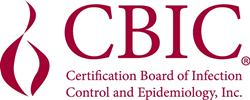[ad_1]

“The a-IPC will arm those interested in the field of infection prevention and control with the baseline knowledge necessary to pursue a career in infection prevention and control,” said 2019 CBIC President Roy Boukidjian, MSN, PHN, CIC, NE-BC.
MILWAUKEE (PRWEB)
September 26, 2019
According to the Centers for Disease Control and Prevention (CDC), on any given day, approximately one in 31 hospitalized patients contracts at least one healthcare-associated infection (HAI). Infection prevention and control (IPC) professionals are often the first line of defense and as the IPC field continues to grow, so too does the importance of staying up-to-date on evolving IPC best practices.
The Certification Board of Infection Control and Epidemiology, Inc. (CBIC) is responsible for developing, implementing and administering the only certification in infection prevention and control that is accredited by the National Commission for Certifying Agencies (NCCA). CBIC is considered the industry leader in providing a standardized measurement of current knowledge needed for individuals practicing infection prevention and control. The CIC® credential is awarded to healthcare professionals who have demonstrated a mastery of knowledge in IPC.
Beginning in 2020, in addition to the CIC®, CBIC will be offering two new initiatives to further advance its mission to provide pathways to assess and maintain infection prevention competency.
The first is an entry-level pathway, the Associate – Infection Prevention and Control (a-IPC) certification examination. Unlike the CIC®, there are no IPC experience or job-specific requirements to apply. The a-IPC is intended to provide a basic assessment of knowledge in infection prevention and control, and to act as a gateway for individuals interested in entering the field of infection prevention and control. The a-IPC will be valid for three years, at which point candidates would continue on to pursue the CIC® credential to maintain certification.
“The a-IPC will arm those interested in the field of infection prevention and control with the baseline knowledge necessary to pursue a career in infection prevention and control,” said 2019 CBIC President Roy Boukidjian, MSN, PHN, CIC, NE-BC. “It is the perfect stepping stone to prove a candidate’s foundational knowledge, interest and dedication to the field.”
The second initiative is an alternate pathway to the current method of recertification by examination, recertification by continuing education. This method is available to all candidates eligible for CIC® recertification beginning in 2020. CICs who choose to recertify this way must obtain a minimum of 40 Infection Prevention Units (IPUs) and show proof of completion of IP-related academic education, research, publications, presentations, attendance at national conferences, and more.
2019 CBIC President-Elect Linda Goss, DNP, APRN-BC, ANP, CIC, FAPIC, said, “Recertification by continuing education has been a long-awaited option for CICs and the CBIC Board of Directors is excited to make it a reality.”
More information about both initiatives will be published to the CBIC website, social media channels, and email communications in the coming months.
The Certification Board of Infection Control and Epidemiology, Inc. was founded in 1981 to protect the public by raising the standard of the infection prevention and control profession through the development, administration and promotion of an accredited certification process. The CIC® certification is held by over 7,600 infection prevention and control professionals working in hospitals, long-term care facilities, ambulatory care centers, and other healthcare and public health settings throughout the world. For more information, please visit http://www.cbic.org/.
Share article on social media or email:
[ad_2]

